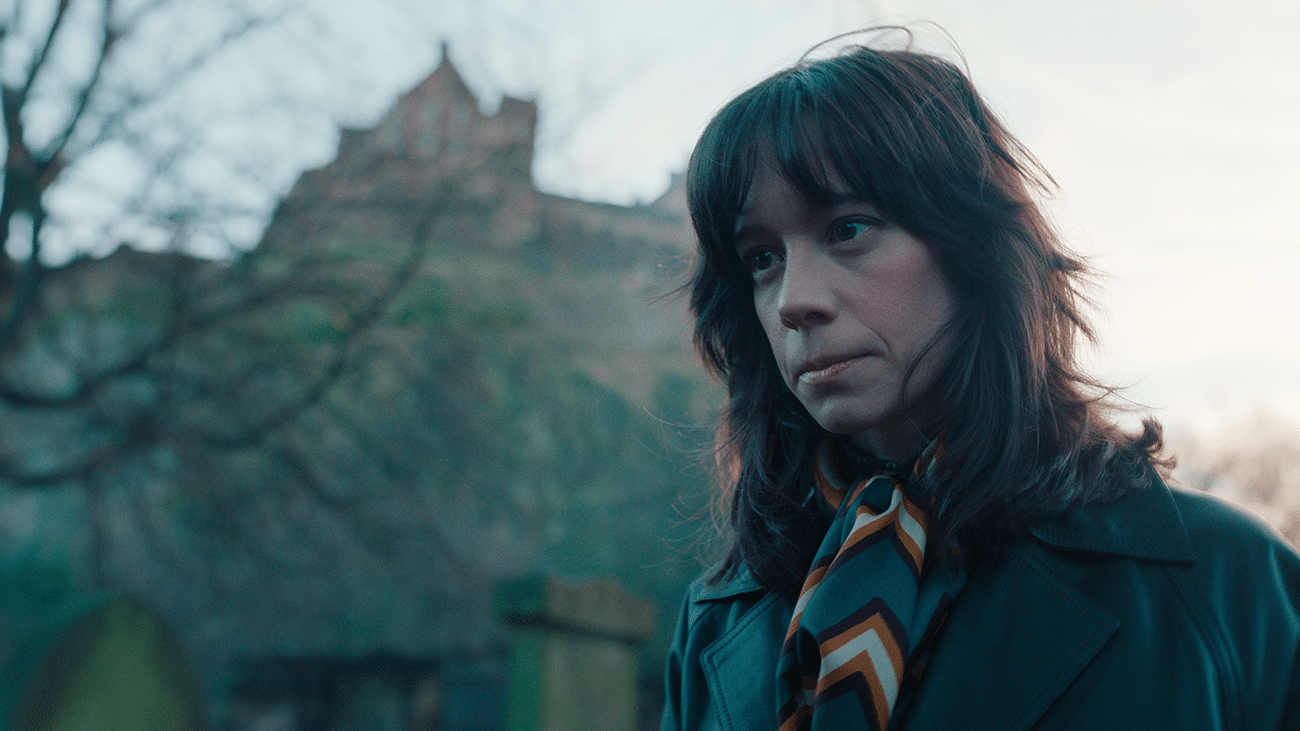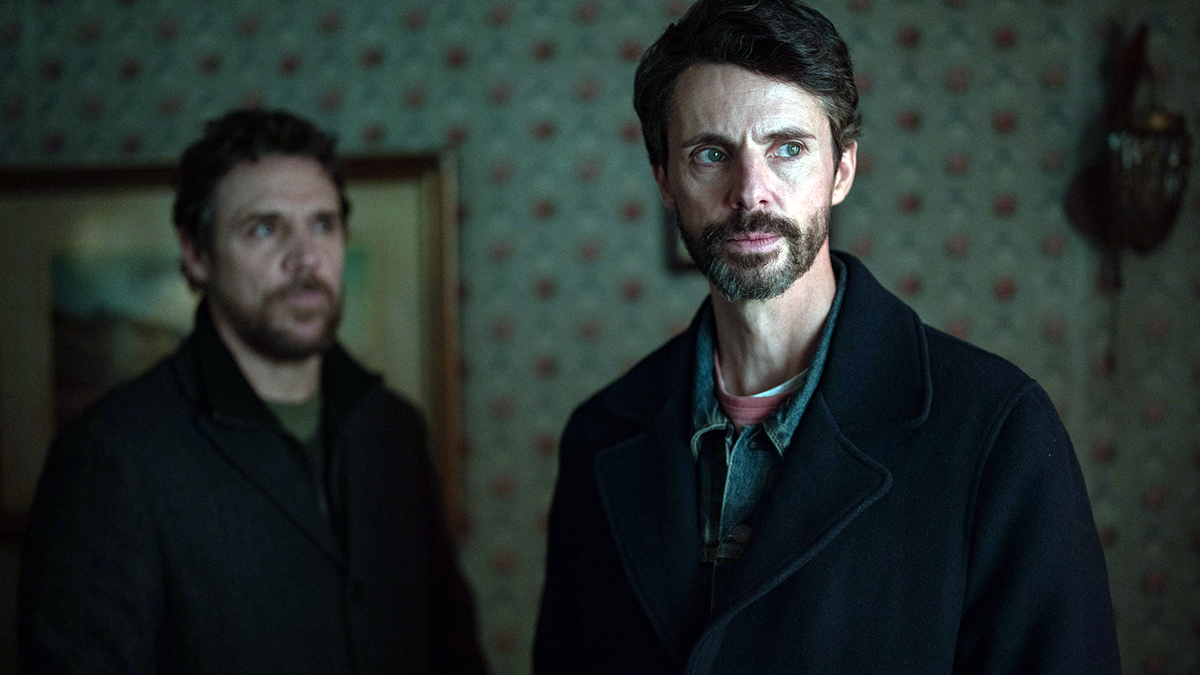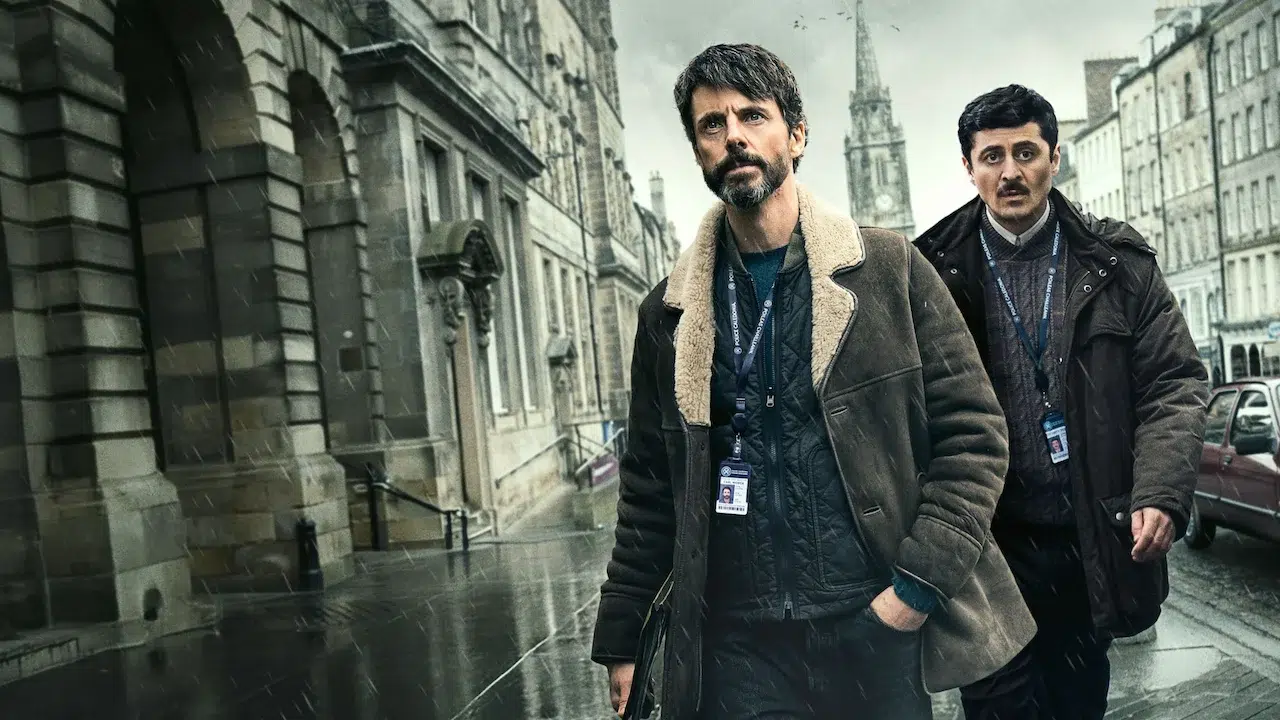Picture: Netflix
A dark and gritty investigative crime drama set in Scotland, Netflix’s new series Dept. Q will keep you glued to the screen through its intricate web of mysteries.
So far in 2025, Netflix has debuted a number of excellent British series. From the chilling true story covered in Toxic Town, to the global phenomenon Adolescence, we’ve been treated to some top-tier stories. May 2025 brings us Dept. Q, a new series from Scott Frank (Godless, The Queen’s Gambit). The show is an investigative crime drama set in Scotland. Is it another hit for the streamer? Let’s investigate.
Based on the best-selling Danish novel The Keeper of Lost Causes by Jussi Adler-Olsen, the series re-locates the original story to Scotland. We follow flawed-but-excellent detective Carl Morck (played by former Downton Abbey star Matthew Goode), who after a traumatic shootout that killed a cop and paralysed his partner, returns to work to find that he’s been assigned to a new department. He’s to head Department Q — a grungy basement floor, where it’s his task to rekindle cold cases. The move appears be an attempt by police chief Moira (Kate Dickie) to get Carl out of the way; his snappy and brash personality makes him inherently destructive to the police force.
Carl unwittingly assembles a team of quirky, unlikely assistants — including enigmatic Syrian Akram Salim (Alexej Manvelov) and Detective Constable Rose Dickson (Leah Byrne) — and together they attempt to tackle the case of Merritt Lingard, a former controversial prosecutor believed to have been drowned four years prior.
Goode delivers a sensational performance as DI Carl Morck; a flawed, but brilliant detective inspector. There’s so many layers to his character; I particularly loved his often twisted perspectives, brashness, and sarcastic comments. The unique personality lends itself to numerous witty moments. But he’s not all that detestable; there’s a very human and vulnerable side to him, particularly a loneliness. He’s English, surrounded by Scottish people, so the show immediately presents him with a sense of isolation.
His humility shines in a few aspects, most notably his relationship with both his half-brother, as well as with police therapist Dr. Rachel Irving (Kelly Macdonald), who’s one of the only people he can truly confide in.
In addition, the chemistry between Morck and unlikely de facto partner Akram Salim — a Syrian refugee with an enigmatic past — was among my favorite elements. The two characters complement each other extremely well — their partnership through the series develops like the finest buddy cop films. Then Rose Dickson and Hardy (Jamie Sives) are added to the team. The whole Department Q team have an excellent chemistry, bouncing off each other — but also advancing the plot and providing plenty of laughs along the way.
As for Merritt Lingard (Chloe Pirrie), who’s very much at the catalyst of the show, I was gripped. Her story is incredibly wide-ranging, complex, and causes ripple-effects across all corners of the series. Pirrie puts in some outstanding performances, most notably when her character is confined inside the hyperbaric chamber; we feel her pain, both mentally and emotionally. The camera work, too, achieves in making the viewer feel a sense of claustrophobia by narrowing the aspect ratio in many of her scenes.

The intertwined cases and entanglements are almost kaleidoscopic at times; there are even one or two scenes that repeat themselves, but they have more clarity and significance the second time around. The series does an excellent job at drip-feeding information, allowing eagle-eyed viewers to piece together inferred clues ahead of the characters. I did feel, however, that the show struggled with uneven pacing at times. It often lingers in unimportant scenes, whereas key moments rush by. Perhaps certain story arcs, such as the shooting Carl was involved in at the start, could be further explored in future seasons. I’m certainly invested.
Through its layered characters, Dept. Q explores themes of redemption, revenge, betrayal of trust, justice, and resilience. Atmospheric throughout, it’s a gritty, grounded series providing a vivid (and disturbingly plausible) picture of crime in Britain.
How does Dept. Q end? Does it leave room for more seasons?
Warning: The following section contains spoilers. Proceed with caution!
Dept. Q season 1 does a great job at introducing us to the core characters, and covering the intricacies of of Marritt Lingard’s case. It delivers a satisfying ending to the story, but leaves room for further instalments. If you were at all confused by the spider’s web of events that occur throughout the show, especially its endgame, we’ve compiled the key takeaways below:
- Merritt’s captors are shrouded in mystery for the majority of the season. In the final episodes, the duo are revealed to be Ailsa (the mother of Harry and Lyle Jennings) as well as Lyle himself. They had Merritt trapped inside a hyperbaric chamber — a vessel typically used to treat decompression sickness in divers. For Merritt, they use it to confine her, also using the pressure to torture her.
- Lyle and his brother Harry had a close relationship growing up. Their upbringing was traumatic. Their mother, Ailsa, would lock them in the hyperbaric chamber for extended durations at a time. The brothers considered this punishment to be normal behaviour. The vessel itself was owned by their father.
- Lyle regularly pursued sociopathic activities throughout his life. Of course, he killed his brother, framing it as a rock climbing accident. While not confirmed, Lyle may have also killed his father by means of setting fire to his home at age 14. He also had a past of coercing children and locking them in the vessel.
- In the beginning of the case, it’s presumed that Harry Jennings had attacked Merritt’s brother William. However, the attack on William was orchestrated by Lyle. “I kept your brother from hurting my brother,” Lyle tells Merritt.
- After locating Merritt, both Carl and Akram confront Lyle. Carl is injured, but Lyle is killed. In addition, Ailsa commits suicide after being caught.
- DI Hardy returns to the force, formally joining the team in Department Q.


Picture: Netflix
The season does leave a few unanswered questions. Mainly, we’re never explicitly informed of who the shooter from the opening scene is. Also, the enigmatic history of Akram is left as a mystery. An immigrant and political refugee, Akram has more military and intelligence than he lets on. In the finale, Morck, having become fond of Akram as a partner, pleas to get Akram a role as a DI.
The series leaves plenty of space open for more seasons. Jussi Adler-Olsen has already written 11 novels, continuing the story of Morck and his team as they solve cold cases in Department Q. There is so much potential to keep the story going. This is one to renew, Netflix.


![21st Aug: Hostage (2025), Limited Series [TV-MA] (6/10)](https://occ-0-1774-448.1.nflxso.net/dnm/api/v6/Qs00mKCpRvrkl3HZAN5KwEL1kpE/AAAABcnzqNn9xwhlvIo36tMAdbuwfmXExhqm9QGnirO6rYJrsoalLEY5ncEz4pdeUkTOsKtbrOJLCwDXYYmfULVw3GynVF_3RCnohPcdgP4ZrdCu0gdRhB23TWJVU2Hcjc9J-areQImCDV2ptMoUAD6SUoZCdnyWEVFE96TmXa7rI1-1LcwehcYKKg7gF0e_TJ09aPOEwCBJUQ.jpg?r=cd1)














